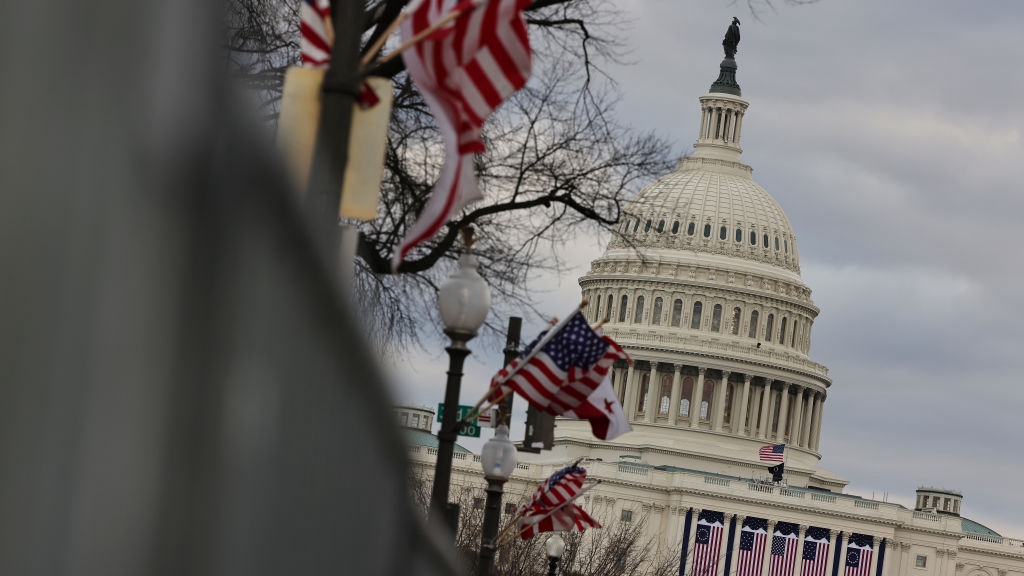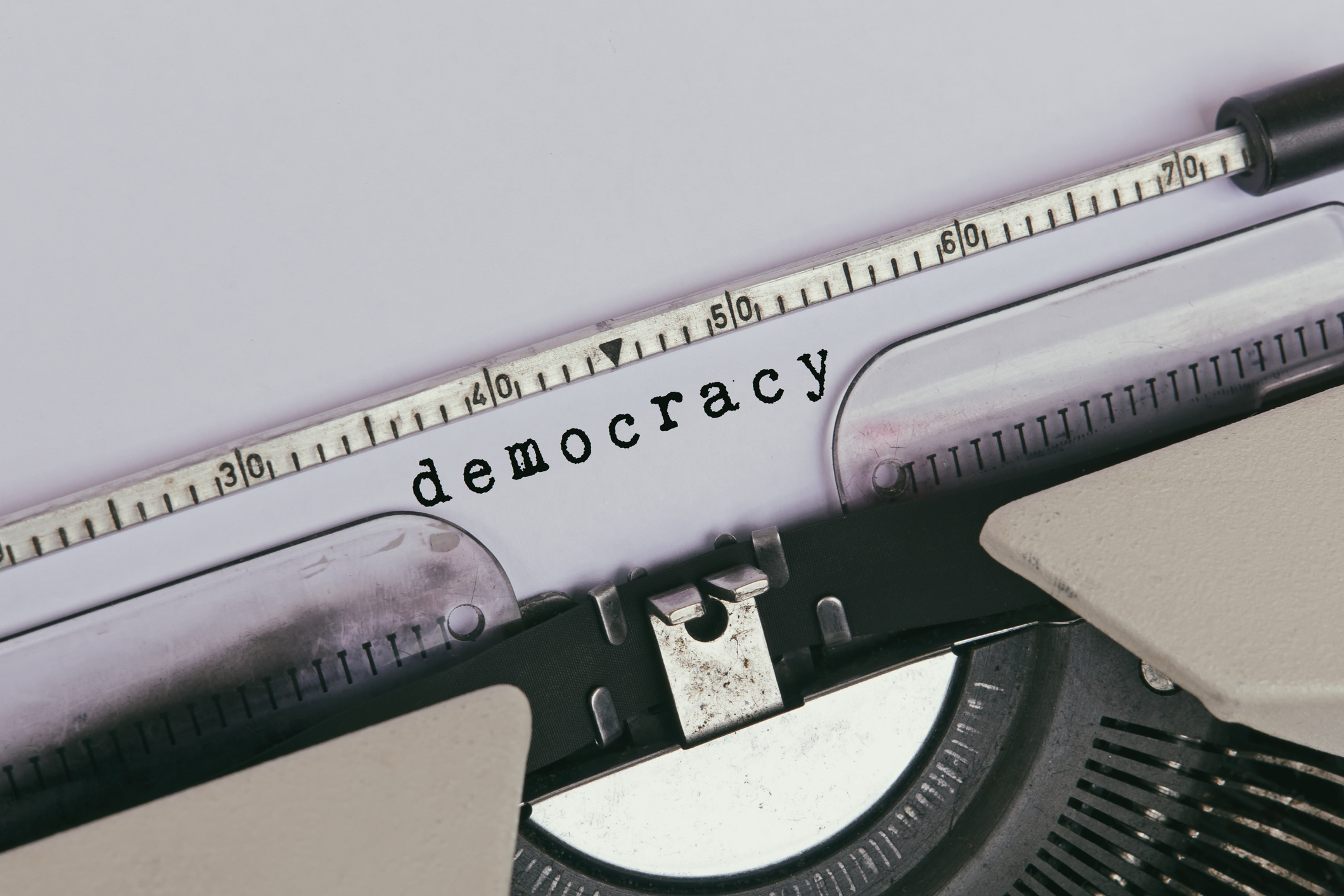
The U.S. Capitol dome is seen beyond a security fence on in Washington, DC, January 17, 2021. /Getty
The U.S. Capitol dome is seen beyond a security fence on in Washington, DC, January 17, 2021. /Getty
Editor's note: The following article is taken from the Chinese-language "The Real Point." The article reflects the author's opinions and not necessarily the views of CGTN.
"Democracy is not a special right reserved to an individual country, but a right for the people of all countries to enjoy." This was a thought-provoking statement by Chinese President Xi Jinping on September 21 general debate of the 76th session of the United Nations (UN) General Assembly. The following day, in a speech at the Carter Center and the George W. Bush Foundation for U.S.-China Relations, the Chinese ambassador to the United States elaborated on what constitutes democracy with Chinese characteristics.
This is a topic worthy of deeper reflection and exchange in the world. However, people should be careful not to fall into the discourse trap of "democracy versus dictatorship" set by some Western politicians, mistaking "anti-China" for "democracy" and thus pushing the world into a dangerous status of ideological confrontation and intentionally provoked division.
The term democracy originated in ancient Greece, which meant "rule by the people" and "sovereignty belongs to the people." Throughout more than two thousand years of Western history, this concept has not been truly realized. However, the West, especially the United States, is trying to control the voice of the world's democracy by relying on its strong economic and military power, simplifying democracy to "one person, one vote" and "multi-party system," and using this as a template to evaluate the political system of other countries such that a country that is compatible to its standards is considered as democratic, otherwise autocratic.
This practice of rendering Sino-Western relations as "democracy versus autocracy" is undemocratic itself. The United States is not qualified to unilaterally define "democracy," let alone imposing its own standards on others or even engaging in the so-called "democratic revolution."
Countries have various forms, and each country has the right to choose a democratic system that suits its own national conditions, represents the will of its own people, and hence brings well-being to the people.
In China, people are at the core of democracy. Whether it is in the elections or implementing a multi-party system, it is only to select appropriate people to govern the country. This is a "whole-process democracy," and all major legislation decisions have been made in accordance with the procedures and through democratic brewing in a scientific and democratic manner. Under this type of democracy, China created a type of meritocracy of "promotion plus election" characteristics.
On the one hand, at the county and township level in China, there is a direct election, and above the county level, there is an indirect election.
The people can elect their representatives to participate in politics, and the representatives can elect the leaders. On the other hand, Chinese officials must be selected level by level and have rich experience in order to serve the people wholeheartedly. This is why Harvard University Kennedy School has a decade of polls showing that the Chinese people have a supporting percentage of the Communist Party of China at over 90 percent annually.

Democracy is not a white elephant; it needs to work. The reality has shown that Chinese democracy of "From the people, To the people, With the people, For the people" works and works well. From the absolute poverty alleviation of 1.4 billion Chinese people to controlling the COVID-19 pandemic and the GDP's contribution rate to the world remains above 30 percent, the governing effectiveness of Chinese democracy has surprised the world.
The regulation school co-founder, Frenchman Michel Aglietta, has said, "Whether economic and political behavior is democratic should be judged by whether it is beneficial to the well-being of the people."
In contrast, red-faced quarrels and protracted motions are not uncommon in the U.S. Congress. Even in the face of the severe impact of the COVID-19 pandemic, the two parties still blamed each other, hindering the equitable distribution of anti-pandemic supplies in various states in the United States, which has resulted in a failed the national relief act.
In addition, according to a 2014 study of nearly 2,000 U.S. policies by Princeton University and Northwestern University, these policies are almost all formulated by the wealthy and interest groups representing large companies, and ordinary people have almost zero influence on decision-making.
Charles Wheelan, a senior lecturer and policy fellow at the Rockefeller Center at Dartmouth College, rightly pointed out that "American democracy is a mirage. The people do not govern the country, and politicians basically only listen to the wishes of the vested interests and the richest people."
So what kind of governance efficiency can such "game democracy" and "money democracy" be transformed into? From the shock of the U.S. Capitol Hill riot, to the time when the number of deaths from COVID-19 in the U.S. exceeded that of the Spanish flu, to the rich people in the U.S. borrowing money from the crisis to increase the gap between the rich and the poor, the failure of the U.S. governance has completely faded the aura of "global beacon of democracy."
The world can be seen clearly from this: The spirit of the "government of the people, by the people, for the people" is now out of reach in the United States. The essence of American democracy is as described by Joseph Stiglitz, the Nobel Prize winner in economics, "of the one percent, by one percent, for one percent" - in the U.S. democracy, one percent of the people take nearly a quarter of the nation's income—an inequality even the wealthy will come to regret.
(If you want to contribute and have specific expertise, please contact us at opinions@cgtn.com.)

